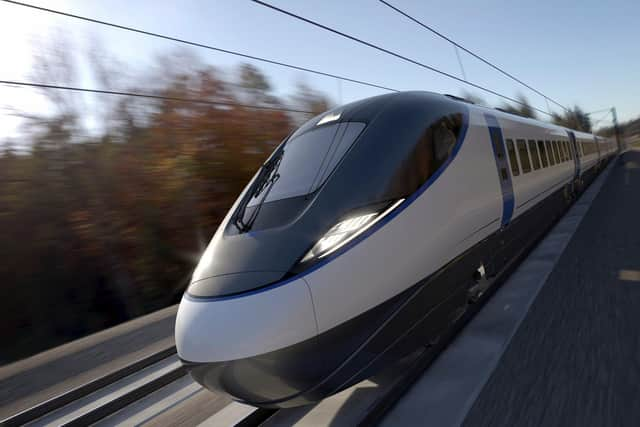HS2 was always going to fail, if only politicians had listen from the start - David Behrens
It’s not the idea that was wrong; it was the execution. We’d all like faster trains and better connections but the HS2 route map was an Etch-a-Sketch doodle that somehow became holy writ. Better and cheaper alternatives were swept off the table by transport officials in thrall to powerful business interests. It was a pantomime that encapsulated everything that’s wrong with the country.
In the end it was Whitehall itself that put the brakes on. The Infrastructure and Projects Authority is the one body the transport department people can’t ignore, because it sits above them in the governmental pecking order. It reports to the Treasury, so it’s the equivalent of an appalled parent slamming the moneybox lid on their kids’ fingers.
Advertisement
Hide AdAdvertisement
Hide AdThere were, said its report, “major issues” with the budget, benefits and even the very definition of the project that were not manageable or resolvable. And that was just for the first two phases, from London to Birmingham and then to Crewe. The last leg into Yorkshire had already been kicked into the long grass.


But what the report got wrong was its timing. It should have been delivered eight years ago, before villages had been ripped apart by bulldozers digging a path to nowhere; before hundreds of families were told their homes would be cut off from their communities; before swathes of countryside were churned up.
At least the deconstruction of Leeds city centre was averted. Had the project been carried to its original conclusion, the inconsiderately-located Hilton Hotel and Asda’s national HQ would have given way to shunting yards, with the displacement of thousands of jobs.
That part of the plan was shelved because HS2 was already leaking money faster than Thames Water. Some £4.1bn was spent before the first shovel hit the ground, with £600m going to “consultants”. What sort of consultants? Certainly not the two Yorkshire engineers who had the door slammed in their faces when they told the transport department of a way to connect more cities with less disruption for £20bn less.
Advertisement
Hide AdAdvertisement
Hide AdTheir names were Colin Elliff and Quentin Macdonald and their plans – a couple of years before HS2 – promised faster journeys right across the North, not just to London. What they didn’t promise was a bonanza for developers and speculators because their little company sat outside the closed community of government contractors which exists to make projects more expensive, not more efficient. All Quentin and Colin had was the support of a few MPs – those people we elect to represent our interests. And no-one in government takes any notice of them.
They didn’t listen either to Archie Norman, the former Conservative shadow transport secretary, who was saying fully 10 years ago it was “delusional” to think HS2 would improve impoverished parts of the North. Even at 2013 prices it would cost £2,000 for every household in Britain to provide a railway just for the rich, he suggested.
This deaf ear caused Colin Elliff to lament the “credibility issue of two mavericks attempting to tell an entire industry and Government machine that they’ve got it all wrong”. As we now know, it was everyone else that had the credibility problem.
So the recommendation now is to rip up the plans and start again. But we won’t be starting from the same place. HS2 was conceived before the war in Europe, before Brexit and – crucially – before we discovered that travel could be a choice, not a necessity. Those business journeys that HS2 was designed to facilitate are now an optional extra for executives who can instead stay at home in their pyjama bottoms, conducting meetings from the waist up on their laptops. In that context, an express service to London is way down the wish list.
Advertisement
Hide AdAdvertisement
Hide AdThe rest of us would be content with having trains at all: services we can rely on to run when they’re supposed to, at a reasonable cost. But we are as far away from that as we are from HS2 – and as we enter yet another prolonged period of strikes by unions marching to their own tune, stability seems about as likely as prime ministerial helicopters for all.
Besides, we can’t afford HS2 now. We’re like Jack Trott; we’ve spent our money on a bag of magic beans that someone we didn’t know said would grow into a railway network.
See what I mean about a pantomime? And unlike a real one, it has no happy ending.